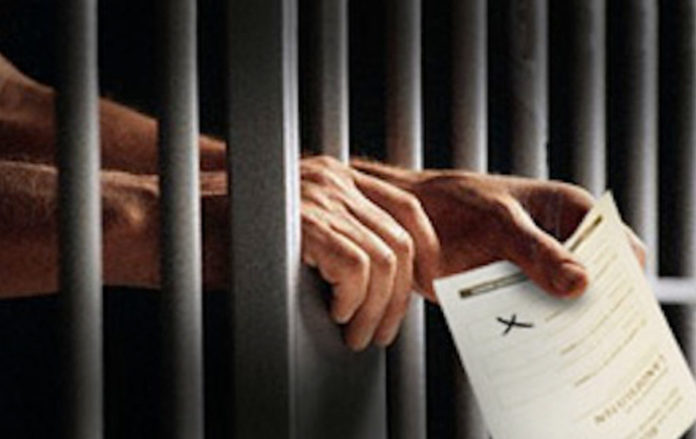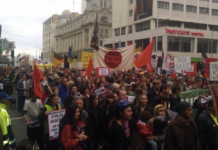The government announced over the weekend that prisoners with sentences of less than three years would once again be given the right to vote, taken away from them a few years ago by National.
Pressure has come from a number of sources, including the United Nations, to reinstate this right. I was really interested in National’s response.
Simon Bridges said that he would remove the right again if National became the government. It is not a matter of law, he said, but of values. So let’s look at these values a bit more closely.
Bridges said that people in prison were not good people and should not be able to vote. Problem one with this view is that it sets up a very shonky binary: all people who are in prison are bad and therefore should not be able to vote, and all people outside the prison are good and should be granted that right. Would he really claim this? I doubt it.
Problem two is that we are supposed to have universal suffrage. Everyone should be able to vote, whether they make bad decisions or good. It is the balance of the votes that leads to the outcomes that we get, not the privilege of one group over another.
Problem three is defining who should or should not get the vote. Are ‘prisoners’ the only category we may want to exclude? How about ‘white supremacists’, for example, or men who watch child pornography. That’s the tricky thing about values – they are a slippery slope down which the principles of a universal suffrage can quickly disappear.
The granting of the right to vote is always contested in democracies and is always debated on the basis of ‘values’. How about this one: only men should have the ability to vote as only they have the intelligence and acumen to choose who should run the country. And women are too emotional, you know! That ‘value’ was comprehensively overturned in Aotearoa in 1893, and showed the world the way. Nowadays, we do not seriously argue that women should not vote, or be MPs, Mayors or Prime Ministers.
People have been excluded in our own history because they were not property owners. Māori had a particularly hard time because the joint ownership of land was not seen as constituting the individual ownership of land so valued by pākeha.
While National can be criticised for its essentially nonsensical position, the Labour coalition really are not much better. What the government has done is applied exactly the same test as National but simply drawn the line higher. Those people sentenced to more than three years in prison are beyond the pale. They should not be allowed to vote. Really? Why three years, and not two or four?
The truth is that most people are in prison because of lifetime abuse, including sexual abuse as a child, drug addictions, mental illness, paths of misfortune, poverty (especially in the case of benefit fraudsters), misguided beliefs about male power in relationships that cause violence (and sometimes worse, as we have seen last week) and suchlike. They are victims as well as perpetrators.
While our society might want these people to suffer a term of incarceration, blowing them off as unworthy to vote simply consolidates the pariah status of these very damaged people. It really does not help at all. Universal suffrage in prisons, coupled with the opportunity for civics education about citizenship, democracy and voting, can itself be part of the solution.
As always, debates about the rights of prisoners get sucked into a most punitive view of the prison population. In this case, these people, and only these people, are to be excluded from the democratic rights enjoyed by all the rest of us, no matter how undeserving we are. It is really sad.
The trouble for the government, I think, is that there is a perception that they are good people without the moral courage to act fully on their beliefs in overcoming the terrible policies of the past thirty years. If they had gone full monty on this: prisoners will be able to vote and will do so because democracy must be inclusive or die… well, would the sky really have fallen? Then they could have challenged Bridges up front on his ‘values’ argument, against principle. Now, we are stuck in a half-world where things are better than they were but there is still a very long way to go.
Dr Liz Gordon is a researcher and a barrister, with interests in destroying neo-liberalism in all its forms and moving towards a socially just society. She usually blogs on justice, social welfare and education topics.






I agree with every word of the above but would like to point out an ommission.
The property rule around voting also locked out the poor (males as females weren’t allowed to vote). You could argue it’s alluded to in the above but certainly not made clear.
The banishment of any sort of class analysis is a disturbing trend of the last 30 years and has resulted in what some American sociologist call the invisibles.
I believe the framing of important social issues purely in terms of race and gender is ubiquitous, distorting and divisive. The underclass is a very diverse demographic.
And note Trump tapped into demograph and exploited their misery very. Sadly he won’t be the last.
Ernie: “The banishment of any sort of class analysis is a disturbing trend of the last 30 years and has resulted in what some American sociologist call the invisibles…..I believe the framing of important social issues purely in terms of race and gender is ubiquitous, distorting and divisive…”
I agree. It’s all too obvious here in NZ, but regrettably widespread, at least in English-speaking societies.
There’s a reckoning ahead on that score, as the US has already seen.
What about the immigrants who have been in our country for 5 minute how come they get to vote
Michelle: “What about the immigrants who have been in our country for 5 minute how come they get to vote”
Good grief: you do have a bee in your bonnet about immigrants, don’t you!
They don’t, of course; get to vote after having been here 5 minutes, that is. They cannot vote until they are at least permanent residents.
Liz – I appreciated your ‘line drawn’ comments; my precise reaction was that Labour didn’t have the guts to go the whole hog , and instead settled on a twee little number: three. And what’s so special about three ?
It’s a shame they were a bit spineless on this – someone should have been standing, thundering in plain language – not pc jargon-speak – that prisoners are members of society etc etc. The principle’s the same regardless; Simon talking about values is Simon just being silly and trying to impress – and failing; I’d be surprised if anyone swallows that from a Nat.
The other thing that annoyed me – and they’re annoying me more and more – is that this govt thinks we’re all dumb, and that we will be impressed by their restoring voting rights to a limited few of ‘ better type’ criminals ho ho ho – while our reality is that we think they’re dumb for thinking that we are, which they probably are – politicians under-estimating the intelligence of the electorate err. They’ve blown it 2x.
Snow White: “….this govt thinks we’re all dumb…”
Heh! yup, that’s surely what it looks like. And it annoys the hell out of me as well.
“….politicians under-estimating the intelligence of the electorate…”
Indeed. The wisdom of the crowd and all that. I wonder if they think that Twitter represents the views of NZers generally. As the unlamented former PM’s flag change debacle showed, it does not.
“Māori had a particularly hard time because the joint ownership of land was not seen as constituting the individual ownership of land so valued by pākeha.”
Maori men were granted the vote in 1867, when the Maori seats were established. Before that, the property qualification applied to them; if they fulfilled the criteria – and some did – they could vote.
Maori women got the vote in 1893, along with all other women.
Not too bad, really, when one looks at the rest of the world.
I note that in the 19c, prisoners weren’t allowed to vote.
“The truth is that most people are in prison because of lifetime abuse, including sexual abuse as a child, drug addictions, mental illness, paths of misfortune, poverty….They are victims as well as perpetrators.”
I believe that universal suffrage should be just that: universal. It should apply to the just and the unjust alike.
Thus all prisoners should be able to vote. However. I disagree with the justification adduced above. There are plenty of people from awful backgrounds who don’t commit crime. Those who do, richly deserve their punishment: they ought not to have too much slack cut for them.
I doubt that many victims would take too kindly to the notion of perpetrators also having that characterisation applied to them.
A fortiori, I doubt that Grace Millane’s family would be disposed to seeing their daughter’s murderer that way.
Comments are closed.